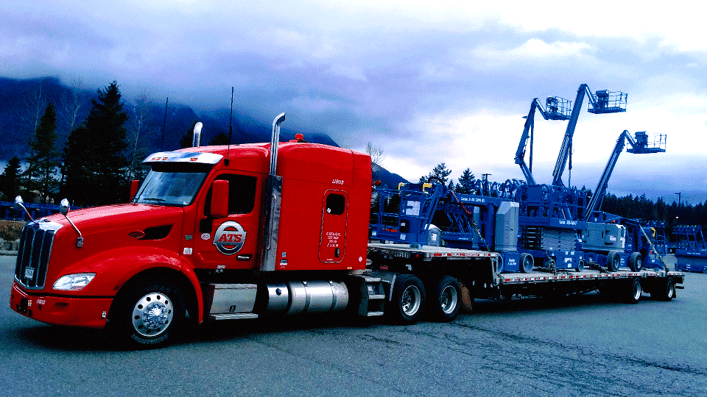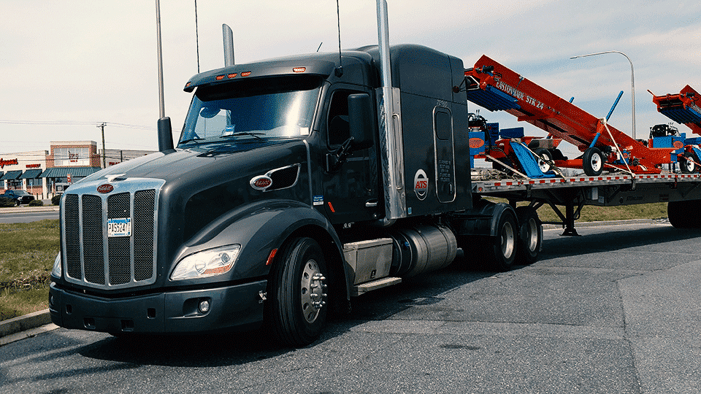- What the CVSA International Roadcheck (Blitz Week) is
- What happens during Blitz Week
- When is DOT Blitz Week 2025 will be
- The focuses of the 2025 CVSA International Roadcheck
- What happens if a driver is found to be non-compliant (And why shippers should care)
- How Blitz Week may impact your ability to find a truck
- How Blitz Week will impact freight rates
- Tips for avoiding supply chain disruptions during Blitz Week
If you’re a shipper wondering how this year’s Commercial Vehicle Safety Alliance (CVSA) International Roadcheck will impact your freight, you’re in the right place.
Each spring, the CVSA’s Roadcheck — also called "Blitz Week," "DOT Blitz Week," or "DOT Week" — causes overall available truck capacity to tighten and freight rates to rise.
With this in mind, you’re probably wondering why this happens, whether it will happen again this year and, perhaps most importantly, what you can do to ensure roadside inspections leave a minimal impact on your supply chain this May.
From our in-house safety teams working diligently to ensure our drivers are safe and compliant, to our logistics experts guiding shippers through tricky periods in the industry, Anderson Trucking Service (ATS) is well-equipped to answer your questions and help you succeed during Blitz Week 2025.
You'll walk away with a better understanding of what the CVSA International Roadcheck is, when it occurs, and how it impacts nearly every North American supply chain.
What is the CVSA International Roadcheck (Blitz Week)?
The CVSA International Roadcheck is an annual three-day period during which commercial motor vehicles and drivers are inspected for compliance with government-issued regulations.
The effort, which takes place across Canada, Mexico, and the U.S., constitutes the world's largest targeted enforcement program for commercial motor vehicles. The ultimate goal of such inspections is to improve and ensure the safety of all motorists traveling on international highways.
These inspections are administered by the Commercial Vehicle Safety Alliance (CVSA), a nonprofit organization of local, state, provincial, territorial, and federal commercial motor vehicle safety officials and industry representatives.
While the CVSA is not part of the Department of Transportation (DOT) or its Federal Motor Carrier Safety Administration (FMCSA), the International Roadcheck is commonly referred to as "DOT Blitz Week" or "DOT Week" due to the agencies' close collaboration on the enforcement of safety regulations in the U.S.

What Happens During Blitz Week?
During Blitz Week, which happens annually in May or June, the CVSA audits motor carriers and truck drivers on their adherence to government-issued commercial vehicle rules and regulations.
The CVSA accomplishes this by working closely with local highway patrol and commercial motor vehicle inspectors across North America to conduct road checks at various inspection/weigh stations, via roaming patrols, and at temporary inspection checkpoints.
When operating at maximum efficiency, law enforcement has historically been able to pull over and assess 15 semi-trucks every minute during the International Roadcheck — which means the drivers hauling your freight are at a much higher-than-normal risk of being pulled over during Blitz Week.
When truckers are flagged down during this 72-hour window, they (and their vehicles) are thoroughly checked for maintenance and driver compliance practices. We'll explain the finer details of the inspection below, but in general, International Roadcheck inspections assess:
- Commercial vehicle mechanical health, including but not limited to:
- Brakes
- Engines
- Lights
- Steering functions
- Fuel systems
- Cargo securement
- Driver credentials
- Hours of service (HOS) adherence and documentation
- Drug/alcohol impairment
- Proper permitting, if applicable
When is DOT Blitz Week 2025?
The 2025 International Roadcheck (AKA DOT Blitz Week) will begin the morning of Tuesday, May 13 and end the evening of Thursday, May 15.
What is the Focus of the 2025 International Roadcheck?
In 2025, the CVSA and its partners will focus on inspecting tires and checking for false records of duty status (RODS).
While we'll dive into both areas of focus below, you can also download the CVSA's 2025 International Roadcheck Areas of Focus Flyer here for more information.
Though the special focuses of Blitz Week change annually, International Roadcheck inspections are always primarily comprised of the North American Standard Level I Inspection.
The Level I inspection is a 37-step procedure that includes an examination of driver operating requirements and vehicle mechanical fitness. Drivers and carriers should expect all 37 steps to be completed during a Roadcheck, with an additional focus on this year's key areas.
Tire Inspection
Proper tire maintenance is critical, as tire failure in transit is dangerous to both the driver and the motoring public. Furthermore, repairing an in-transit tire failure can be expensive and time-consuming for carriers, while regular preventative maintenance can proactively prevent tire issues — with a much smaller price tag.
During inspections this year, drivers can expect the inspector to look for:
- Low tread depth
- Audible air leaks
- Flat tires
- Belt material or casing ply exposed in the tread or sidewall
- Tread or sidewall separation
- Bulges in the sidewall
- Improper repairs, such as rubber-coated plugs in the sidewall
- Items lodged between dual tires
In addition to the inspection of these components, drivers should also expect to be assessed on all key elements included in the vehicle portion of the Level I inspection.
Check out the CVSA's North American Standard Roadside Inspection Vehicle Cheat Sheet for more information about what inspectors will be looking for during this portion of your International Roadcheck.

False Records of Duty Status (RODS)
Hours-of-service (HOS) regulations limit driving hours and mandate rest breaks, helping to prevent truck drivers from operating vehicles while fatigued and keeping roads safe for all motorists.
But these rules are only effective when drivers accurately report their times and duty statuses in their record of duty status (RODS), a log that commercial motor vehicle drivers must maintain to record their driving activity.
Failure to record, complete, or retain the log — or knowingly falsifying logs and/or other related reports — is an out-of-service (OOS) violation, which requires the inspector to place the driver out of service, restricting that driver from operating their vehicle until the violation has been addressed.
The practice of falsifying RODS logs (typically so drivers can spend more time on the road than is allowed under HOS regulations) is a dangerous one. Fatigued drivers are more likely to be involved in crashes and incidents while in transit. Furthermore, a false RODS log violation opens the driver and/or carrier up to prosecution.
During the driver portion of your International Roadcheck inspection, the inspector will check your RODS, documents, license or commercial driver’s license, medical examiner’s certificate and skill performance certificate (if applicable), Drug and Alcohol Clearinghouse status (in the U.S.), seat belt usage, and alcohol and/or drug impairment.
The CVSA's North American Standard Driver Inspection Cheat Sheet has more information about what drivers can expect during this portion of the inspection.
While checking a driver's RODS for HOS compliance during the 2025 International Roadcheck, inspectors will also look for:
- Electronic logging device (ELD) tampering, including driving while not logged in, disconnected devices, and improper edits
- Ghost drivers, i.e. claiming a co-driver when no co-driver is present
- Improper use of the personal conveyance special driving category
- Improper use of other exceptions, including adverse driving conditions
- Recording off-duty time while performing work for a motor carrier or non-motor carrier
Needless to say, all truck drivers should ensure their truck, trailer, cargo, and all documentation and logs are fully compliant over these three days.
This is easier said than done; even if a driver leaves their starting point with everything in perfect order, it’s impossible to guarantee that something won’t occur during transit.
This leaves truck drivers far less motivated to move freight during Blitz Week.
What Happens If a Driver is Non-Compliant? (And Why Should Shippers Care?)
If a truck driver is found to violate any rules or regulations during a CVSA International Roadcheck, three things will happen next.
First, the driver and the freight they’re hauling must immediately stop moving until each issue is addressed. If they're missing bolts or a hubcap, for example, they’ll need to get those things fixed. Or, if they’re in violation of HOS regulations, they’ll need to rest until their clock resets.
As you might imagine, the prolonged delays caused by non-compliant carriers over Blitz Week can affect shipping schedules for shippers and carriers alike.
Next, a driver found in violation of a commercial motor carrier mandate will be immediately examined for other violations. The trucking industry takes safety standards seriously. A single violation — be it a set of loose bolts or otherwise — could be an indicator of deeper issues with the health of a vehicle and/or the safety practices of a carrier, so additional inspections are administered to weed out any further issues.
Finally, drivers who are found to be non-compliant are given an OOS violation. OOS violations directly impact each motor carrier’s compliance, safety, accountability (CSA) scores — a scale indicating their overall safety “rating.”
Failing a roadside inspection and receiving an OOS violation is a two-point violation for that driver.
Truck drivers are each given individualized CSA scores. Any violations they incur — and the points associated with them — remain on a driver’s CSA scorecard for three years, which can affect their reputation with carriers.
If you're wondering why you as a shipper should care what happens to a non-compliant driver, take note: Blitz Week (and its potential repercussions) often temporarily changes driver behavior, which can ultimately have a big effect on your ability to find a truck at a decent rate.
Related Content: What is a CSA Score and Why Should I Worry About It?
How Will Blitz Week Impact Your Ability to Find a Truck?
Drivers will be less willing to be on the roads (especially on short notice) during Blitz Week, so it will likely be harder to find and secure capacity.
During these 72 hours, moving freight becomes risky business for trucking companies and their drivers. Since any number of things could go wrong during inspection and take a driver temporarily out of service, drivers are far less motivated to put their reputation — and livelihood — on the line.
With fewer options in the market, you can also expect longer turnaround times and, yes, higher freight rates to secure the capacity you can find.

How Will Blitz Week Impact Freight Rates?
Because there will be fewer trucks on the road over the week of May 12, shippers may end up paying more to secure capacity.
(And yes, we did say the whole week — remember, drivers are hesitant to hit the road around this time!)
In an industry where pricing is influenced by the relationship between the supply of transportation solutions and the overall demand for these services in a particular area, the International Roadcheck makes an impact by removing a large portion of “supply” from this equation.
Demand for transportation services, however, won’t subside over these three days — leading trucking companies to charge more than they would in normal conditions.
As a result, if you’re unable to steer your shipments clear of this week by choosing to ship before or after it, you’ll pay a pretty penny to move them over Blitz Week.
2 Ways to Avoid Supply Chain Disruptions During Blitz Week
When it comes to the CVSA’s International Roadcheck and its impact on your supply chain this year, here are two easy, actionable steps for success:
- Be aware, plan ahead, and communicate your needs
- Offer flexibility to your trusted carriers
1. Be Aware, Plan Ahead, and Communicate Your Needs
The simple fact that you're reading this article is a great sign that when May 13 rolls around, you’ll be ready. Still, it's important to educate yourself on what these inspections are, why they’re administered, and when they’re happening in your area.
The dates of the International Roadcheck are subject to change. For this reason, you must stay up-to-date on the latest news from the CVSA. The CVSA website, CVSA.org, is the best source of information regarding the International Roadcheck.
Additionally, it’s important to plan ahead by anticipating this temporary disruption and communicating your needs to your transportation provider(s).
Be sure to reach out to carriers and explain what you’re hoping to move during this period, how much flexibility you have on your time/deadline requirements, and how you’d like them to communicate with you should a problem arise.
For an uninterrupted supply chain throughout Blitz Week, transparent communication with each of your trusted providers will be your greatest defense against disruption.
2. Offer Flexibility to Trusted Carriers
Sometimes drivers don’t want to move freight during Blitz Week.
Though it might not always be possible, allowing your carrier some flexibility on pick/drop dates during this time will significantly improve the freight rates you receive.
Ask your trusted partners how they plan to operate over the week of May 12 and consider allowing them to add your freight to their schedules as they see fit.
Though the best carriers have no reason to worry about non-compliance, trucking companies always appreciate some leniency — especially in times of congestion, as Blitz Week so often is.
In the end, the more timing flexibility you can give carriers during this time, the better. If nothing else, try to avoid rigid pickup/drop appointments over this three-day stretch. A little wiggle room can help carriers schedule their drivers as optimally as possible.
Related Content: 4 Out-Of-The-Box Ways to Save Money On Your Freight Rates
Ship Smarter — and for Less — in 2025
Now that you have a better understanding of how CVSA's International Roadcheck impacts the trucking industry — including how the related capacity shortage impacts service levels and freight rates — you’re better prepared for May 13.
Don’t forget to bookmark the “News” page on Commercial Vehicle Safety Administration’s website so you can easily access information on this year’s checks and stay up-to-date on future developments.
Planning for Blitz Week takes a bit of proactivity, but with the right resources and knowledge at your fingertips, your supply chain can remain uninterrupted during these tricky times in the transportation industry.
Our Freight Shipping Calendar is a great resource to that end. It’s a free, downloadable PDF calendar featuring all the best (and worst) days to ship in 2025 based on historical rate data, holiday timing, and industry events like CVSA International Roadcheck.
Download it today and share it with your team to use as a reference as you plan out your freight for the rest of the year. By shipping on the best days on this calendar, you’ll save money in your transportation budget — and avoid rate spikes during Blitz Week and beyond.





